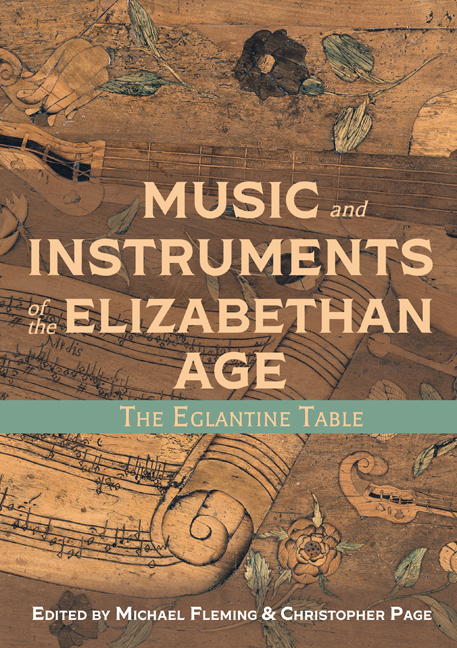Book contents
- Frontmatter
- Dedication
- Contents
- List of Illustrations
- Foreword
- Acknowledgements
- Note to the Reader
- List of Abbreviations
- Introducing the Eglantine Table
- Part I Silent Things
- Part II Music and Instruments
- Part III Broader Views of the Eglantine Table
- Appendices
- Glossary
- Bibliography
- List of Contributors
- Index
- Plate section
16 - Tables of the Mind
Published online by Cambridge University Press: 24 March 2021
- Frontmatter
- Dedication
- Contents
- List of Illustrations
- Foreword
- Acknowledgements
- Note to the Reader
- List of Abbreviations
- Introducing the Eglantine Table
- Part I Silent Things
- Part II Music and Instruments
- Part III Broader Views of the Eglantine Table
- Appendices
- Glossary
- Bibliography
- List of Contributors
- Index
- Plate section
Summary
In the summer of 1568, perhaps even as the Eglantine Table was making its way north from a London workshop to Derbyshire, George Turberville of Dorset was accompanying an embassy to Russia to promote the interests of the Muscovy Company. On his return he wrote to a friend in verse about the pervasiveness of board games in Russia, even among the serfs. ‘Because thou lovest to play friend Parker’, Turberville wrote, it might be of interest to know that in Muscovy
The common game is chesse, almost the simplest will
Both give a checke and eke a mate, by practise comes their skill.
Againe they dice as fast, the poorest rogues of all
Will sit them downe in open field, and there to gaming fall.
The alien environment in which Turberville finds himself serves only to emphasise the pervasive, indeed global, presence of gaming tables, evidence of a deep human compulsion to become captivated by boards, frames and grids, even in an environment, like a Russian field, most uncongenial to them.
Within the bounds of the friezes of the Eglantine Table, a profusion of interests are represented: in plant life, in godly and secular music, both vocal and instrumental, in the art of writing and in musical notation, in short-lived games of chance and in lines of inheritance stretching back to time immemorial. The teeming surface of the Table reveals the richness and variety of country-house life in the sixteenth century; it is a virtuosic attempt to fit, within a limited frame, the manifold occupations of an accomplished mind which, in the spirit of Renaissance humanism, desires to make itself universal: farsi universale. Whatever else the Eglantine Table might be, it is a witness to the compulsion, noted by Turberville in Russia, to turn from the complex and chaotic world towards schematic reductions of the same – a compulsion that can be traced through the tabular terminology used to describe these practices. Represented in the Eglantine marquetry are not only chess, backgammon and dicing tables (also known by the native form boards), but also music represented on the grids of tablature and the fretted fingerboards of the stringed instruments themselves.
- Type
- Chapter
- Information
- Music and Instruments of the Elizabethan AgeThe Eglantine Table, pp. 219 - 228Publisher: Boydell & BrewerPrint publication year: 2021



